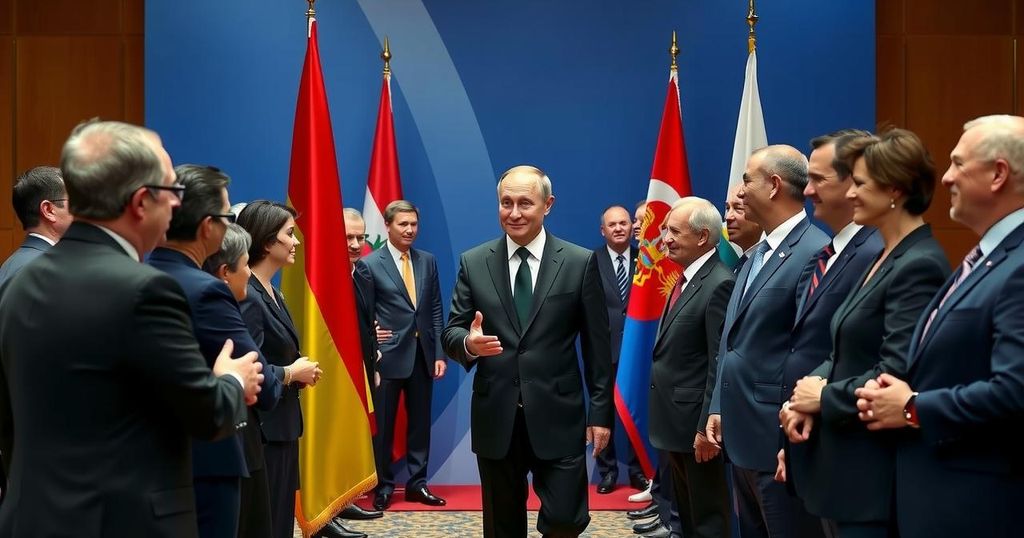Putin Hosts 36 World Leaders at Brics Summit, Challenging Western Isolation

Russian President Vladimir Putin hosted a significant Brics summit with 36 world leaders, aiming to display Russia’s global partnerships despite isolation from the West. The gathering emphasizes the group’s intent to counter Western economic dominance, particularly against the US dollar, while grappling with ideological differences among expanding membership. Analysts suggest the summit bolsters Russia’s international standing, despite the complexities surrounding its geopolitical actions and the ongoing Ukraine conflict.
In a move regarded as a significant demonstration of diplomatic power, Russian President Vladimir Putin hosted 36 world leaders at the recent Brics summit, amid ongoing geopolitical tensions and accusations labeling him a potential war criminal by the International Criminal Court (ICC). This gathering included representatives from nations such as China, India, and Iran, signaling Russia’s intention to showcase its global partnerships despite its prevailing isolation in the West, particularly following its military actions in Ukraine since February 2022. Controversy surrounded the potential attendance of UN Secretary General António Guterres, whose office had not confirmed his plans, as Moscow hinted at his presence at the summit. This event marks the largest international conclave hosted by Putin since the onset of the Ukraine conflict. The leaders convened for three days to discuss the future of an expanded Brics group, which has evolved from its initial five members—South Africa, Russia, China, Brazil, and India—to include nations like Egypt, the United Arab Emirates, Ethiopia, and Iran, with Turkey and Saudi Arabia amongst those considering membership. The agenda primarily focuses on establishing the Brics group as a counterforce to Western economic dominance, particularly regarding the supremacy of the US dollar. An Iranian leader present at the summit remarked, “Brics can be a way out of American totalitarianism and create a path of multilateralism.” However, the expanding membership poses challenges related to maintaining ideological unity, as divergent priorities exist among the member states. For instance, while countries like India and Brazil share a desire to reduce reliance on the dollar, they do not align as closely with the anti-Western rhetoric prevalent in statements from China and Russia. Analysts like Alex Gabuev from the Carnegie Russia Eurasia Centre suggest that the summit serves as a crucial platform for Russia, effectively conveying the narrative that Russia is far from an isolated entity but rather integral to the formation of a new global order. Notably, Putin’s participation is significant as he had previously avoided attending the Brics summit in Johannesburg due to arrest threats stemming from the ICC warrant against him. The outcome of this summit could influence international perceptions and relationships, particularly in light of potential shifts in political leadership in the United States and developments in Ukraine. Additionally, while the Brics+ group possesses a collective GDP surpassing both the G7 and the EU, its voting influence within global financial institutions like the International Bank for Reconstruction and Development is considerably limited by the financial contributions of its individual members. Despite these challenges, the Brics+ coalition continues to aim for the establishment of economic systems resilient to US sanctions and pressures, particularly advocating for alternatives like the internationalization of the yuan in global trade.
The Brics group emerged as a coalition aimed at fostering economic collaboration among emerging economies, providing a counterbalance to Western-dominated institutions and financial systems. Since its inception, it has expanded beyond its founding members to include more nations recognizing the need for diverse economic partnerships in a rapidly evolving global landscape. The summit provides a strategic platform for member states to discuss issues relevant to their collective goals, seek collaborative pathways to mitigate Western economic influence, and establish multilateral agreements.
In conclusion, the recent Brics summit hosted by President Putin showcases Russia’s effort to assert its global influence despite facing significant challenges and isolation from Western countries. The gathering of diverse nations under the Brics framework highlights the group’s aspirations to create a counterweight to Western economic dominance and suggests a potential reconfiguration of international relations as emerging economies seek to enhance their cooperative frameworks. As the landscape continues to evolve, the implications of this summit may resonate far beyond the immediate discussions, potentially altering the future dynamics of global governance and economic collaboration.
Original Source: www.theguardian.com








